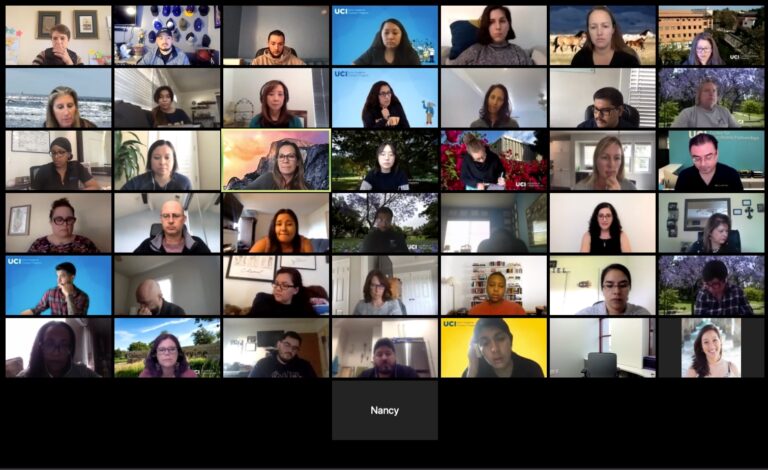
May 25, 2020, the day of George Floyd’s death, became a day of national racial reckoning in America. All levels of campus leadership responded with statements of outrage and solidarity with the Black community. Assistant Vice Chancellor for Educational Partnerships Stephanie Reyes-Tuccio responded:
“George Floyd’s death opened long-festering wounds that lie under the surface of our lives. The death of George Floyd, and many many others, violently remind us that we live in a world that is far from the ideals of equality we profess.”
This moment was an opportunity for the Center for Educational Partnerships (CFEP) staff to learn about the history and experiences of Black and African American people in the U.S. to better understand current issues relating to inequality and to provide context for understanding the communities CFEP works with. The overarching goal is to improve CFEP programs and practices to serve its students, families, and schools better.
In the fall quarter, CFEP staff engaged in a self-curated virtual Black Lives Matter (BLM) Class. Facilitated by 10 of its directors, CFEP developed a mandatory all staff training that included multi-faceted activities to engage staff including: a Race Card Project to distill thoughts, experiences, and observations; readings on Confederate monuments, the school-to-prison pipeline, and the health effects of historical redlining where low-income and minority communities were systemically cut off from lending and investment; spoken word videos including a poetry slam Letter To Your Flag and A Conversation about Growing up Black; and a group viewing and breakout group discussions of Ava DuVernay’s documentary 13th that explores in-depth the history of racial inequality in the U.S., and its manifestations in the disproportionate number of African-Americans caught in our prison industrial complex.
The winter quarter continues internal work as each staff member is working through UCOP’s 6-course online training series, U.C. Managing Implicit Bias, designed to increase awareness of implicit bias and reduce its impact at the University.
Beyond the trainings, to foster engagement and social solidarity, CFEP staff created its own anti-racist literature-focused Book Club. Readings and discussions have featured Michelle Alexander’s The New Jim Crow, Bettina Love’s We Want To Do More Than Survive, Michele Obama’s Becoming, Ibram X. Kendi’s How to Be Anti-Racist, and Verna Myers’ What if I Say The Wrong Thing? CFEP Assistant Director Patricia Anderson received a $2,500 IDEA (Inclusion, Equity, Diversity & Advancement Spaces: Learning to Action Groups) grant from the School of Education Climate Council to fund the reading group.
CFEP’s UCI History Project has organized various workshops that center on Black voices and agency, including Teaching the 1619 Project—a workshop for K-12 educators that provides examples of how to integrate the 1619 Project into their classrooms; Centering Black agency and resistance in the study of Imperialism and World War I in its 10th Grade Group Series; developing curriculum for Lynwood 7th Grade Teachers that highlights the thriving of West African learning, religiosity, and trade at the Site of Encounter, Timbuktu, during the middle ages; and partnering with colleagues at the UCLA History and Geography Project to support Black Lives Matter at School implementation at Lynwood Unified. Director Nicole Gilbertson also participates in California History Project network-wide bi-weekly discussions on BLM and Anti-Racism to develop formal statements coming out of this work intended to revise its mission statement and inform its vision moving forward.
CFEP staff are also leading campus initiatives to dismantle systemic racism at UCI. CAMP Director, Dr. Pheather Harris, serves on the Steering Group for the UCI End Racism Initiative, a grassroots collective bringing together faculty, staff, and students to develop campus-wide recommendations on ending systemic racism at UCI. Assistant Director Patricia Anderson co-leads one of the initiative’s working groups on Campus Culture: Retention, Persistence and Thriving in the Academy to identify policies and practices that help or prevent Black faculty, staff, and students from thriving at UCI.
Dr. Harris has also been essential to the development of the campus Inclusive Excellence Action Plan and serves on numerous campus advisory committees aimed to improve Black student success at UCI, particularly in STEM fields. Leveraging Inspiring Futures Through Educational Degrees (LIFTED) recently formalized the first in-prison B.A. completion program offered by the U.C. system. It will enable incarcerated individuals to earn a bachelor’s degree from UCI.
This work will continue in the spring quarter with workshops to review and revise our programs in light of learning that has taken place over the year. This review will pay particular attention to not just who we serve but how we communicate and work with students, families, and schools.
“Our responsibility goes beyond ensuring that the curricula of our programs are culturally sensitive and relevant. “
Our programs must be designed to empower students to achieve the dreams they have for themselves.” “The ethos among CFEP staff is that what we do matters – silence is not an option,” adds Anderson.
